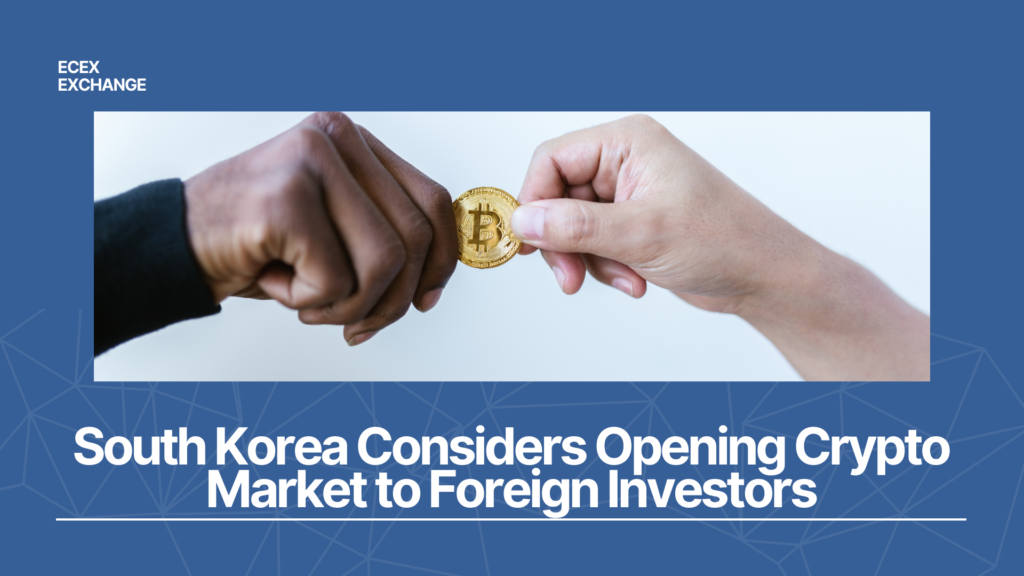South Korea Considers Opening Crypto Market to Foreign Investors
South Korea, one of Asia’s most influential crypto hubs, is exploring the possibility of allowing foreign nationals to access local cryptocurrency exchanges—a move that could significantly impact the global crypto landscape.
The South Korean Financial Intelligence Unit (FIU) is conducting a feasibility study on enabling foreign investors to register and trade on Korean virtual asset trading platforms. This development follows increasing global interest in Korean blockchain innovation and trading volumes.
If approved, this policy change could enhance liquidity, boost foreign capital inflow, and solidify South Korea’s position as a key crypto-financial hub in Asia.
Current Restrictions on Foreign Investors
Currently, non-Korean residents are prohibited from trading on licensed Korean crypto exchanges such as Upbit, Bithumb, Coinone, Korbit, and Gopax, unless they have a Korean bank account with real-name verification and residency status.
These restrictions were introduced under South Korea’s 2021 Virtual Asset Service Provider (VASP) regulations, aimed at:
- Preventing money laundering
- Enforcing KYC/AML compliance
- Ensuring tax transparency
As a result, most foreign users are blocked from accessing Korean exchanges, despite their popularity and competitive trading features. This has led many international investors to trade Korean tokens like KLAY (Klaytn) or AXS (Axie Infinity) through foreign platforms, often at less favorable prices and with higher spreads.
Why South Korea’s Crypto Market Matters
South Korea is one of the most active cryptocurrency markets globally, with daily trading volumes that often rival those of the U.S. and Japan. Major Korean exchanges like Upbit consistently rank in the top 10 worldwide by volume, particularly for altcoin trading.
Key statistics:
- Over 6 million registered crypto users in Korea (more than 10% of the population)
- Upbit alone processes billions in daily volume
- Korean exchanges dominate in retail altcoin trading
Allowing foreign users to access this market could:
- Provide greater global exposure for Korean crypto projects
- Improve price discovery and market depth
- Attract institutional capital from abroad
- Strengthen South Korea’s role in Web3 innovation
Global Comparisons: What Other Countries Are Doing
South Korea isn’t the only nation balancing security with access in its crypto market. Here’s how other major crypto jurisdictions treat foreign participation:
| Country | Foreign Access to Exchanges | KYC Rules |
| Japan | Allowed via licensed exchanges | Strict KYC and anti-money laundering |
| Singapore | Allowed, but exchanges must register with MAS | High compliance standards |
| United States | Yes, but limited on offshore platforms | KYC/AML mandatory |
| South Korea | Currently restricted | Real-name verification, Korean bank acct |
By opening its exchanges to foreign users, South Korea could align itself with global crypto leaders and further integrate into the international digital asset ecosystem.
Potential Benefits of Opening the Market
The FIU’s consideration comes amid increased pressure from domestic exchanges, blockchain startups, and international investors to liberalize access.
Benefits for South Korea:
- Boost in tax revenue from foreign trading activity
- Enhanced liquidity on Korean exchanges
- Stronger positioning in Asia’s fintech scene
- Attraction of international Web3 projects and VCs
Benefits for foreign investors:
- Direct access to high-volume Korean altcoin markets
- Lower spreads and better liquidity compared to offshore platforms
- Opportunity to engage with Korea’s dynamic crypto ecosystem
Challenges and Considerations
Despite the potential upsides, the proposal also raises regulatory and operational concerns, including:
- How to verify foreign identities securely across jurisdictions
- Compliance with Korean anti-money laundering laws
- Integration of international tax reporting standards
- Preventing market manipulation and wash trading
Korean regulators are known for their conservative and risk-averse approach, especially following past scandals involving crypto exchange hacks and fraud. Therefore, any policy change will likely include stringent compliance frameworks and gradual implementation.
What’s Next? Timeline and Expectations
While there’s no official date for when foreign access may be granted, the FIU’s research is expected to conclude by mid-2025, with potential pilot programs launched shortly after. A phased approach may involve:
- Starting with verified institutional investors
- Expanding to retail investors with enhanced due diligence
- Collaborating with foreign regulators for cross-border oversight
If successful, this could mark a new era of cross-border crypto cooperation and open up South Korea’s vibrant crypto economy to the world.
Conclusion
South Korea’s exploration into opening its crypto exchanges to foreign investors reflects a maturing digital asset industry ready to embrace global participation—while maintaining high standards for security and compliance.
For crypto exchanges, regulators, and users worldwide, this move could:
- Increase market access and diversity
- Strengthen liquidity and innovation
- Set a precedent for regulatory evolution in Asia
As the Korean government studies the policy shift, global crypto investors should watch closely—because if the gates open, South Korea could become one of the most attractive crypto markets on the planet.
